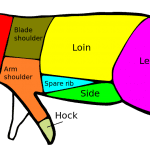Anyway, here are some of the interview questions and answers, with a link to the rest of them. And if you go to the site, you can download a chapter of the book for free.
From Q&A with Dr. Gene Veith and A. Trevor Sutton – CPH Blog:
What prompted you to write Authentic Christianity at this time?
Gene Veith: “Evangelicalism” is discredited, with many in that movement running away from the name. Lots of Christians are giving up on the pop Christianity that has been trying to imitate the culture. Some are looking to Catholicism, only to find that today’s church has drifted far from its former identity. The “nones” are on the rise, as are the “spiritual but not religious.” We believe that Lutheranism offers a Christianity that can resolve today’s religious problems and that can address in a unique way the struggles of people caught in the postmodern condition.
Trevor Sutton: We are constantly looking for ways to share the promises of Jesus with our contemporary culture. However, there is a problem when Christians think that we must continually update our theology and practices so that they accord with the non-church culture. Both Gene and I are convinced that speaking to a postmodern world does not require reinventing our beliefs; instead, we think that Lutheran theology uniquely speaks to the postmodern condition and the world today.
In your preface, you say this book is about how the Lutheran tradition addresses the spiritual struggles of today. Without giving too much away, what are some of the spiritual struggles this book will address?
Veith: Recovering the presence of God. Finding redemption from guilt, imperfection, and moral failure. Coming to grips with suffering and what it means. Understanding that the physical world has spiritual significance. Discovering the purpose of life. Learning how to function in the world without compromising your beliefs. How to grow spiritually.
Sutton: Along with what Gene has mentioned, the Lutheran tradition offered a robust theology of work long before “work-life integration” was a trendy topic for TED Talks. The Lutheran tradition has always sought to bring together the various parts of our life—work, spirituality, family, citizenship, and church—into a unified life in Christ Jesus. . . .
What do you think are some of the main misconceptions of the Lutheran tradition and why?
Veith: That Lutherans are stuffy. That they are standoffish. That they only talk to one another and have nothing to do with other Christians. That they are always fighting with other church bodies and with one another. There is some validity to these charges, but the misconception comes from not understanding why Lutherans seem to act this way. Doctrine and fellowship concerns are very important, but in a way that can only be fully appreciated from the inside of the church. As it is, many Christians do not even know what Lutherans believe. I once talked with an Anglican priest who was astonished to learn that Lutherans worship with the liturgy and have such a high view of the Sacraments. His ignorance was his fault, but it was also the fault of us Lutherans, who haven’t done as good a job as we should in conveying what we believe and what we practice. This book, in part, is an attempt to get the word out about what Lutheran Christianity is.
Sutton: The biggest misconception about the Lutheran tradition has to do with Martin Luther. People often assume that we follow Luther, focus on Luther, and are obsessed with Luther. The truth is that Lutheran theology is all about Jesus. We follow Jesus, we focus on Jesus, and we are obsessed with Jesus. To be certain, this misconception may be a result of Lutherans talking more about Luther and not enough about Jesus. Nevertheless, at its core, the Lutheran tradition is all about Christ Jesus. . . .
What is one thing you hope your readers will take away from your book?
Veith: The role of the physical realm in Christianity, as opposed to the hyper-spiritual Gnosticism that prevails today. Lutheranism can help readers realize that God is not an abstract idea or a transcendent being looking down on a world of evil and suffering, but that He has come in the flesh, that He took the world’s evil and suffering into Himself on the cross, and that He continues to come to us through the physical means of water, bread, and wine.
Sutton: I want people to read this book and recognize that speaking to contemporary culture does not require us to water down our theology or change our practices. We can engage postmodern individuals while still being authentically Christian. In fact, I think the only way that we can engage disillusioned secularists and burned-out believers is with a robust and authentic Christianity. Many people today are wary of the fake fog of smoke machines in worship and skinny jeans on a preacher in a feeble attempt to be relevant. This book offers a real and robust Christianity to our contemporary culture.
[KEEP READING. . . ]
Photo of Trevor Sutton & Gene Veith at CPH, by Concordia Publishing House. Used with Permission.














